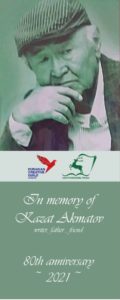
Kazat Akmatov was born at the beginning of the World War II, in Bosteri in the Kyrgyz Republic of the Soviet Union. Both his own father and his adoptive father perished and hence, locals named the young orphan Kazat, meaning war or fight. His talent as a narrator emerged early and when he was between ten and twelve, he was punished at school for detaining his classmates with his stories. At fifteen he was commissioned to write a play for his school. The Rich Landowner and the Day Labourers was applauded, although its high standard led parents to suspect that it had been plagiarized from work by Soviet writers on class struggle.
While studying journalism, Akmatov confined his poetry to notebooks, believing that serious subject matter was better presented in prose. Having already worked for the Komsomol (the youth division of the All-Union Com munist party) and served as an officer in the Soviet army, he was committed to a career as a writer after finishing University. Instead, he was ordered to join the army by the USSR’s Minister of Defense, purportedly to strengthen the ranks. KGB spies had long suspected him of being a nationalist and “immature” communist and the Party organization of the military part of the “Guards” within the Central Asian Military District raised the exclusion of Lieutenant Akmatov from the Communist Party. He was recognized as guilty for asking: “How much time does it take to declassify documents in the Soviet Union, in accordance with the law?”
As a consequence, his first novel Two Strings of Life was not published until 1972. Successful on many levels, it entered the Party’s stream of criticism against corrupt officials from the Soviet economic organs. Akmatov was awarded the Nikolai Ostrovsky Prize: the most prestigious accolade for young writers of the USSR. The next stage in Akmatov’s oeuvre, characterized by novels Earth Time and Years around the Sun as well as the play, Night of Divorce, proved life-changing. All three works were imbued with the author’s compassion for the tragic fate of Kyrgyz people. The media however, submissive to taunts by the Communist Party, printed a series of derogatory articles. Examined by the Central Committee of the Communist Party, Earth Time was declared “anti-Russian” and Years around the Sun,”anti-Soviet”. Night of Divorce was pronounced to be “anti-Party”, and the Ministry of Culture closed the play and even set alight the props. The author felt attacked from all sides: he was fired from his job in journalism; his books were withdrawn from sale, and the Party ensured that he received none of the high awards and prizes which he had won. No-one would publish Kazat Akmatov.
In retaliation, Akmatov publicly announced his withdrawal from the Com munist Party and began to organize the Democratic Movement of Kyrgyz stan. This movement which demanded the separation of Kyrgyzstan from the Soviet Union, the elimination of the Communist Party in Kyrgyzstan and the declaration of independence for Kyrgyzstan, came to fruition in 1991.
After five years in politics as a Member of Parliament, Akmatov returned to writing and much of his work is now published in many languages. His novel Arhat, available in five languages, has won several international prizes and the State Prize of Kyrgyzstan.
Thirteen Steps towards the Fate of Erika Klaus has been well acclaimed. Based on a true incident, it follows the tragic fate of an extraordinary and naïve young Norwegian woman, who arrives in Kyrgyzstan as a Peace Corps volunteer. Set in a remote outpost, where a fascist hide-out has emerged from the ruins of the former Soviet Union, this work explores the daily brutality faced by both Klaus and as significantly, the Kyrgyz people around her.
A writer rather than a politician, Akmatov nevertheless, continues to raise awareness of the oppression of basic human rights throughout Asia and following his description of the brutal regime in Chet, his new novel Shahidka highlights the fate of the Chechen nation and its eternal fight for freedom through a love story between a young Chechen man and a young Russian woman.
